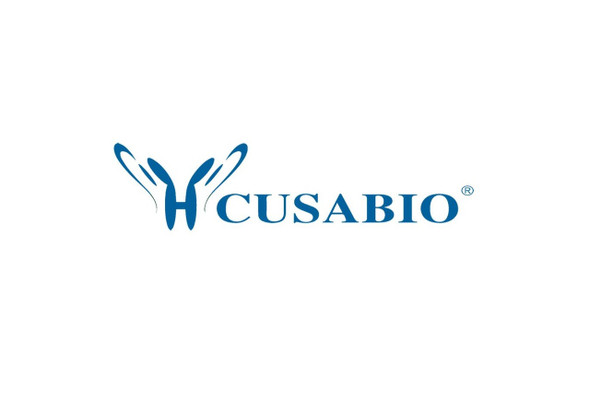Cusabio Human Recombinants
Recombinant Human Thioredoxin reductase 2, mitochondrial (TXNRD2) | CSB-EP885675HU
- SKU:
- CSB-EP885675HU
- Availability:
- 13 - 23 Working Days
Description
Recombinant Human Thioredoxin reductase 2, mitochondrial (TXNRD2) | CSB-EP885675HU | Cusabio
Alternative Name(s): Selenoprotein Z ;SelZTR-betaThioredoxin reductase TR3
Gene Names: TXNRD2
Research Areas: Others
Organism: Homo sapiens (Human)
AA Sequence: QRDYDLLVVGGGSGGLACAKEAAQLGRKVAVVDYVEPSPQGTRWGLGGTCVNVGCIPKKLMHQAALLGGLIQDAPNYGWEVAQPVPHDWRKMAEAVQNHVKSLNWGHRVQLQDRKVKYFNIKASFVDEHTVCGVAKGGKEILLSADHIIIATGGRPRYPTHIEGALEYGITSDDIFWLKESPGKTLVVGASYVALECAGFLTGIGLDTTIMMRSIPLRGFDQQMSSMVIEHMASHGTRFLRGCAPSRVRRLPDGQLQVTWEDSTTGKEDTGTFDTVLWAIGRVPDTRSLNLEKAGVDTSPDTQKILVDSREATSVPHIYAIGDVVEGRPELTPIAIMAGRLLVQRLFGGSSDLMDYDNVPTTVFTPLEYGCVGLSEEEAVARHGQEHVEVYHAHYKPLEFTVAGRDASQCYVKMVCLREPPQLVLGLHFLGPNAGEVTQGFALGIKCGASYAQVMRTVGIHPTCSEEVVKLRISKRSGLDPTVTGCSG
Source: E.coli
Tag Info: N-terminal 6xHis-SUMO-tagged
Expression Region: 37-524aa
Sequence Info: Full Length of Mature Protein
MW: 68.9 kDa
Purity: Greater than 90% as determined by SDS-PAGE.
Relevance: Maintains thioredoxin in a reduced state. Implicated in the defenses against oxidative stress. May play a role in redox-regulated cell signaling.
Reference: Kim J.-R., Lee Y.H., Lee S.-R., Kim B.H., Rhee S.G., Kim J.H.The DNA sequence of human chromosome 22.Dunham I., Hunt A.R., Collins J.E., Bruskiewich R., Beare D.M., Clamp M., Smink L.J., Ainscough R., Almeida J.P., Babbage A.K., Bagguley C., Bailey J., Barlow K.F., Bates K.N., Beasley O.P., Bird C.P., Blakey S.E., Bridgeman A.M. , Buck D., Burgess J., Burrill W.D., Burton J., Carder C., Carter N.P., Chen Y., Clark G., Clegg S.M., Cobley V.E., Cole C.G., Collier R.E., Connor R., Conroy D., Corby N.R., Coville G.J., Cox A.V., Davis J., Dawson E., Dhami P.D., Dockree C., Dodsworth S.J., Durbin R.M., Ellington A.G., Evans K.L., Fey J.M., Fleming K., French L., Garner A.A., Gilbert J.G.R., Goward M.E., Grafham D.V., Griffiths M.N.D., Hall C., Hall R.E., Hall-Tamlyn G., Heathcott R.W., Ho S., Holmes S., Hunt S.E., Jones M.C., Kershaw J., Kimberley A.M., King A., Laird G.K., Langford C.F., Leversha M.A., Lloyd C., Lloyd D.M., Martyn I.D., Mashreghi-Mohammadi M., Matthews L.H., Mccann O.T., Mcclay J., Mclaren S., McMurray A.A., Milne S.A., Mortimore B.J., Odell C.N., Pavitt R., Pearce A.V., Pearson D., Phillimore B.J.C.T., Phillips S.H., Plumb R.W., Ramsay H., Ramsey Y., Rogers L., Ross M.T., Scott C.E., Sehra H.K., Skuce C.D., Smalley S., Smith M.L., Soderlund C., Spragon L., Steward C.A., Sulston J.E., Swann R.M., Vaudin M., Wall M., Wallis J.M., Whiteley M.N., Willey D.L., Williams L., Williams S.A., Williamson H., Wilmer T.E., Wilming L., Wright C.L., Hubbard T., Bentley D.R., Beck S., Rogers J., Shimizu N., Minoshima S., Kawasaki K., Sasaki T., Asakawa S., Kudoh J., Shintani A., Shibuya K., Yoshizaki Y., Aoki N., Mitsuyama S., Roe B.A., Chen F., Chu L., Crabtree J., Deschamps S., Do A., Do T., Dorman A., Fang F., Fu Y., Hu P., Hua A., Kenton S., Lai H., Lao H.I., Lewis J., Lewis S., Lin S.-P., Loh P., Malaj E., Nguyen T., Pan H., Phan S., Qi S., Qian Y., Ray L., Ren Q., Shaull S., Sloan D., Song L., Wang Q., Wang Y., Wang Z., White J., Willingham D., Wu H., Yao Z., Zhan M., Zhang G., Chissoe S., Murray J., Miller N., Minx P., Fulton R., Johnson D., Bemis G., Bentley D., Bradshaw H., Bourne S., Cordes M., Du Z., Fulton L., Goela D., Graves T., Hawkins J., Hinds K., Kemp K., Latreille P., Layman D., Ozersky P., Rohlfing T., Scheet P., Walker C., Wamsley A., Wohldmann P., Pepin K., Nelson J., Korf I., Bedell J.A., Hillier L.W., Mardis E., Waterston R., Wilson R., Emanuel B.S., Shaikh T., Kurahashi H., Saitta S., Budarf M.L., McDermid H.E., Johnson A., Wong A.C.C., Morrow B.E., Edelmann L., Kim U.J., Shizuya H., Simon M.I., Dumanski J.P., Peyrard M., Kedra D., Seroussi E., Fransson I., Tapia I., Bruder C.E., O'Brien K.P., Wilkinson P., Bodenteich A., Hartman K., Hu X., Khan A.S., Lane L., Tilahun Y., Wright H.Nature 402:489-495(1999)
Storage: The shelf life is related to many factors, storage state, buffer ingredients, storage temperature and the stability of the protein itself. Generally, the shelf life of liquid form is 6 months at -20?/-80?. The shelf life of lyophilized form is 12 months at -20?/-80?.
Notes: Repeated freezing and thawing is not recommended. Store working aliquots at 4? for up to one week.
Function: Maintains thioredoxin in a reduced state. Implicated in the defenses against oxidative stress. May play a role in redox-regulated cell signaling.
Involvement in disease:
Subcellular Location: Mitochondrion
Protein Families: Class-I pyridine nucleotide-disulfide oxidoreductase family
Tissue Specificity: Highly expressed in the prostate, ovary, liver, testis, uterus, colon and small intestine. Intermediate levels in brain, skeletal muscle, heart and spleen. Low levels in placenta, pancreas, thymus and peripheral blood leukocytes. According to PubMed:10608886, high levels in kidney, whereas according to PubMed:9923614, levels are low.
Paythway:
Form: Liquid or Lyophilized powder
Buffer: If the delivery form is liquid, the default storage buffer is Tris/PBS-based buffer, 5%-50% glycerol. If the delivery form is lyophilized powder, the buffer before lyophilization is Tris/PBS-based buffer, 6% Trehalose, pH 8.0.
Reconstitution: We recommend that this vial be briefly centrifuged prior to opening to bring the contents to the bottom. Please reconstitute protein in deionized sterile water to a concentration of 0.1-1.0 mg/mL.We recommend to add 5-50% of glycerol (final concentration) and aliquot for long-term storage at -20?/-80?. Our default final concentration of glycerol is 50%. Customers could use it as reference.
Uniprot ID: Q9NNW7
HGNC Database Link: HGNC
UniGene Database Link: UniGene
KEGG Database Link: KEGG
STRING Database Link: STRING
OMIM Database Link: OMIM









